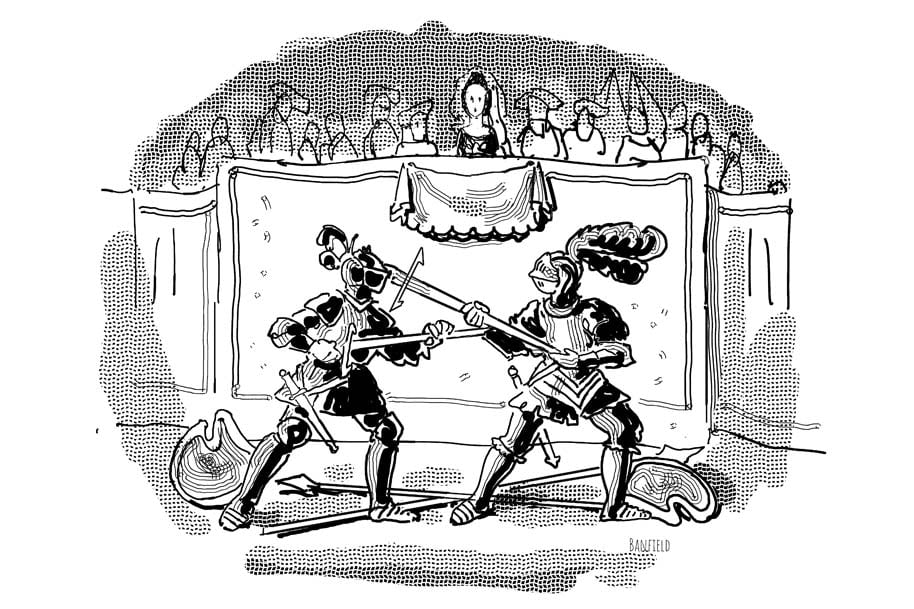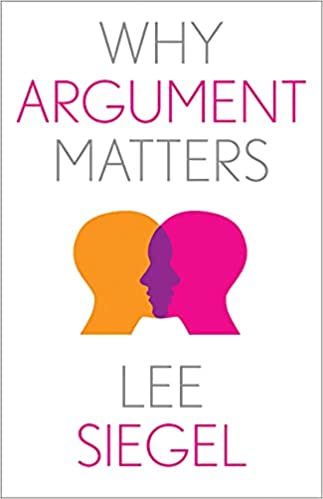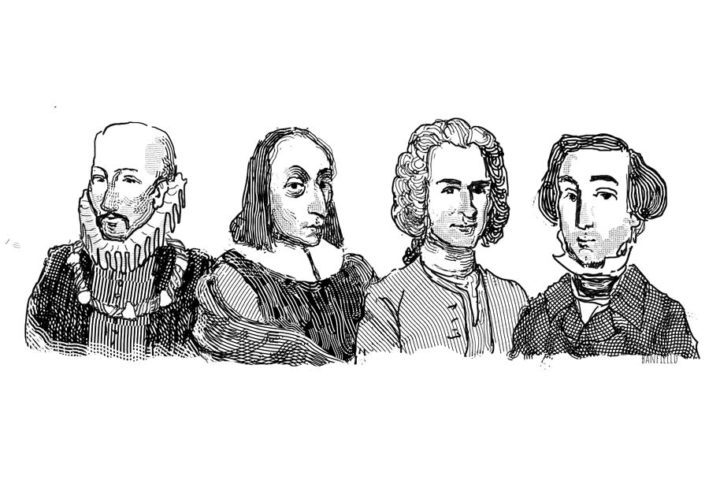Book Reviewed
A popular t-shirt, available on Amazon from several suppliers for between $15 and $22, reads in big capital letters: “YOU MATTER.” Then, in smaller print beneath: “Unless you multiply yourself by the speed of light squared…then YOU ENERGY.” I like to think that this is a sign that the vogue for the most irritating formula now in favor with publishers, advertisers, and P.R. agents—“x matters” or “why x matters”—is finally beginning to wane. There is something more than defensive, almost desperate about it. It is an assertion of the personal will of its promulgator against the inexorable opposition of reality and time: I insist that x matters because there are now fewer and fewer people in the world to whom x does matter.
“Black Lives Matter” is up front about this, since its aggressiveness would make no sense without the presumption that the slogan’s originators are angry precisely because black lives don’t matter, or don’t seem to them to matter to the police or the powers that be. Perhaps it is also no coincidence that Mazda came up with its new slogan, “Driving Matters,” in 2015, just as the world was beginning to expect the next generation of motor vehicles to be self-driving.
* * *
Yale University Press’s series of volumes under the rubric “Why x matters” has made the phrase, as Lee Siegel’s Why Argument Matters reminds us, “a registered trademark of Yale University”—perhaps as a way of asserting that Yale University still matters. Already published titles in the series suggest that to Yale what matters so far are, in alphabetical order (does it matter?), Acting, Architecture, Arendt, Baseball, the Constitution, the Dreyfus Affair, the New Deal, Niebuhr, Poetry, Preservation, the Romantics, Translation, Trilling, and Writing. None of them, not even the Constitution, seems to me to have fallen so far or so fast into the cultural junkyard of things-that-no-longer-matter-to-most-people as Mr. Siegel’s subject of Argument.
He, however, would not agree with me. A widely published cultural critic and recipient of a National Magazine Award for Reviews and Criticism, Siegel starts his rehabilitation job with a radical reconception of what argument is. To me, and I imagine to most people, the type of argument that doesn’t seem to matter anymore, or doesn’t matter very much, is a process of inductive, deductive, or dialectical ratiocination associated with philosophy, science, law, and other intellectual disciplines. Siegel, by contrast, defines it like this: “Argument flows from our intuitive certainty that our right to exist is the most elemental truth, and that our right to exist is bound up with our freedom to think about existence in specific ways. These are abstractions that we hope will become real, either through subtlety and irony or through earnest declamation and attack.”
In other words, argument is self-assertion. It is one measure of the desuetude into which genuine argument has fallen that a respected university press apparently sees nothing untoward about this.
* * *
Though he claims to distinguish between “argument,” on the one hand, and “dispute,” “quarrel,” and “debate,” on the other, Siegel’s definition makes argument much more like these other things than it is to argument as traditionally understood. It amounts to what the British call “argy-bargy,” and of that there is undeniably more than ever—even if none of it matters to anyone apart from those who are either spouting invective at one another, or enjoying the new spectator sport that such invective has become. Twitter has democratized this pastime, so that it now appears to be more popular (at least among the young) than Baseball.
One important difference between these two quite different senses of the word “argument” is that the first depends absolutely upon the assumption of the good faith of him or her who poses the argument, while the second does not—indeed, is inconsistent with such an assumption. Argument, as the word used to be understood, requires us to believe that the arguer is telling us what he really thinks, even if he only thinks it for the time it takes to make his argument, or else all his arguing is in vain. It is because those in public life typically no longer make this assumption about each other that the first kind of argument no longer matters and the second does.
We prefer, that is, to disregard what our interlocutors are actually saying on the grounds that, by the terms of our argument, they really must be saying something quite different. In an argument about economics, for example, the point at issue is easily lost if side A prefers instead to accuse side B of socialism and side B would rather accuse side A of fascism, though neither socialism nor fascism has been mentioned or even thought of except by the side opposing it. Obviously, it’s easier to oppose the straw men of socialism or fascism than it is to oppose whatever the other side is actually proposing.
Without the assumption of good faith on both sides, there can be no argument but only name-calling, personal abuse, moral indignation, and the imputation of malevolence or evil-doing against each other. It can be no solution to this sad state of affairs to say that these things can also be arguments. Siegel’s version of argument is what an advertiser might call the new and improved Argument, with extra existential oomph. He cites as one example the Widow Loman’s words about Willy in Arthur Miller’s Death of a Salesman: “Attention must be paid!” But this cannot be quite right even on its own terms. Willy’s lament is not really an assertion of his right to exist but of his existence to be noticed, to be heard, to be paid attention to by the world. It’s just another sales job, in other words, another way of saying: Willy Loman matters!
* * *
Attention must be paid? No! Attention must be earned. Why should attention be paid to Willy more than anybody else in the world? If his right to be paid attention to is everybody’s right, how are we to pay attention to everybody? And has everybody, then, a reciprocal obligation to pay attention to us? The word loses all meaning. If everything matters, then nothing matters. But the Willy Loman view of life, that the world owes him its attention, must be the fons et origo of the fame culture that only really came into being with the internet and, especially, with social media, more than half a century after Willy’s time. That has become, just in the past 20 years, the place to go for those who think they have a claim on the world’s attention.
It is also the reason why our politics is now a clash of rival dogmas rather than anything our grandfathers would have recognized as argument. About dogma there can be no more argument than there can about the axioms of geometry. It excludes argument by definition. Instead, our public life has become no more than a Twitter-like exchange of personal abuse and the kind of moral one-upmanship known as virtue-signaling. Siegel shows that he knows this when he writes, a propos of online disputes masquerading as argument, that “an argument conducted in words…has to be not just the sharpest rebuttal of an opponent’s position. It has to be the fullest understanding of an opponent’s position.”
That is correct, and well said. But for him, this understanding always seems to be in the service of strengthening one’s own argument, which is to say one’s self-assertion, never for modifying it through the persuasiveness of someone else, respect for whose point of view can hardly be genuine if it precludes the possibility of being persuaded by it. Mere persuasion, he hints, doesn’t rise to the level of argument, in his sense. To be persuaded by somebody else’s argument seems to him a kind of betrayal of one’s own unique truth, the assertion of which is the whole business of being alive.
Thus, “[i]n watershed moments, argument returns to its ragged, street-fighting roots.” Those “street-fighting roots” also lead Siegel to suggest that it is futile to try to distinguish—as John Locke does in An Essay Concerning Human Understanding with his informal fallacies of the argumenta ad hominem, verecundiam, ignorantiam, etc.—between legitimate and illegitimate forms of argument: “For human beings, however, fallible creatures that we are, the so-called ‘fallacies’ of argumentation operate more like essential tips on how to mount an effective argument.” What might seem a counsel of despair to others is something Siegel celebrates: “But argument has always been suffused with emotional appeals, illogical leaps, personal attacks, misrepresentations of an opponent’s position.” This seems to me like arguing that, because people have been killing each other since Cain killed Abel, it’s pointless to try to arrest and prosecute murderers.
* * *
Again and again he despairs of reason and its power to lead us to truth—which is nevertheless okay with him, since there is no truth but the personal kind anyway. Truth, like reality, is necessarily plural. Thus, the argument between a traditional mimetic understanding of literary fiction and “experimental” writers simply boils down to “changes in the way the cultural vanguard perceives reality.” This is the place where argument, in any traditional sense, stops, while to Siegel, as to Twitter antagonists, it is the place where it begins. “Argument” in his sense, then, not only permits but requires the arguers to talk past each other and never arrive at a meeting of the minds. If they listen to each other, it is only for the purpose of strengthening their own argument.
The book is divided into two parts: “The Art of Argument” and “The Argument of Art,” and the second part elaborates on the author’s theory of argument as self-assertion. The same is true of art, he thinks, and “the proof that art is an argument lies in the degree to which a work of art gives rise to argument.” That makes no sense to me. Anything can give rise to argument. How to load the dishwasher has probably given rise to more arguments than most works of art, but that can’t make dishwasher-loading itself into an argument without some risk of terminological inexactitude. Likewise,
Art is not judged by its truth or its validity. The stakes are much higher. Art is judged by the strength of its claims to be. Before we agree to judge the truth or validity of a work of art, we have to accept that the world created by a work of art exists.
As if that were a particularly difficult thing to do. But what does it mean to say that something is an argument if no one else cares enough to want to argue about it? “Argument” here seems to be a kind of copyright statement—this little bit of hopeful reality belongs to me—like Yale University’s copyright on the formula “Why x matters.” Here, for example, is how Siegel argues that Shakespeare’s sonnets are all arguments, by taking as his example perhaps the most famous of them, Sonnet 18, “Shall I compare thee to a summer’s day,” the argument of which he summarizes thus:
Shall I compare you to a summer’s day? Well you’re even more lovely and more gentle than a summer’s day but when you think about it, that’s not really saying much since summer can get pretty ugly, what with winds blowing everything all over the place and the heat and humidity. Let’s drop the summer simile then and state the unlovely truth: beautiful forms decline, and even the most remarkable of them become plain in time. So listen, my dear, your only hope of beating the ravages of aging is having me sing your praises in my poetry, and if you think that sounds like an attractive exchange, then why don’t you come by the theater tonight after everyone has gone home and we’ll talk about it.
Needless to say (I hope), there is nothing in the sonnet corresponding to the last four clauses of the third sentence here (“…and if you think…,” etc.). Reducing a Shakespeare sonnet to a pick-up line is the kind of thing that gives vulgarity a bad name. Or did. Back when vulgarity mattered. The summarizer is obviously trying to reproduce in more contemporary terms the playfulness of the Shakespearean conceit—or argument, if you prefer—because he recognizes that, if you want to call this an argument, it is a particular kind of argument: a sophistical one that is not meant to be taken seriously but rather to show off the poet’s verbal dexterity and cleverness. If this were all it is, however, we would hardly be likely to remember it more than 400 years after it was written.
* * *
Siegel might have done better to say not that all Shakespeare’s sonnets are arguments but that they are all banalities, which would be equally true, if they are reducible to their arguments. What makes them interesting and beautiful to us as much as, or even more than, they were to his contemporaries is the added layers of meaning created by the way the argument is imaged, framed, and phrased. The argument is nothing but the literal, bare-bones structure on which the poetry is hung, and it is the poetry that makes Shakespeare Shakespeare—the Shakespeare that Ben Jonson recognized is not of an age but for all time.
“In the plays of Shakespeare, poetic language becomes argument,” Siegel writes. I would say the reverse is true. Argument becomes poetry; and poetry is not only a much bigger and better thing than argument but something that very few arguments can ever aspire to. To treat the two terms as equivalent is to make banalities of both. Moreover, if any artistic statement is considered to be an argument ipso facto it must be, like other arguments, not subject to anyone else’s judgment as either good or bad, legitimate or illegitimate.






